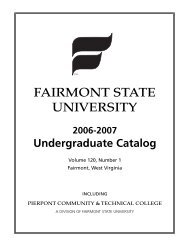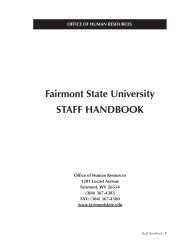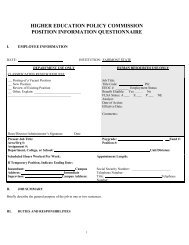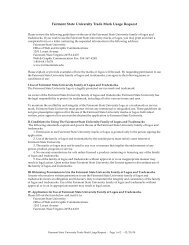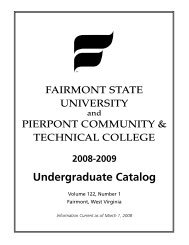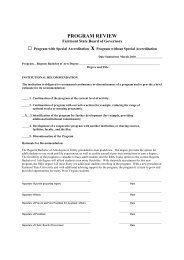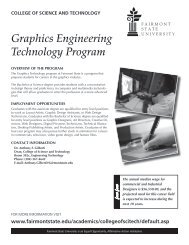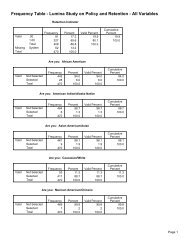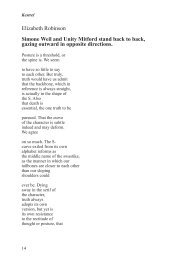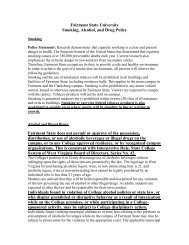Faculty Handbook - Fairmont State University
Faculty Handbook - Fairmont State University
Faculty Handbook - Fairmont State University
You also want an ePaper? Increase the reach of your titles
YUMPU automatically turns print PDFs into web optimized ePapers that Google loves.
Primary consideration will be given to that professional and scholarly achievement accrued<br />
since the attainment of the current rank.<br />
33<br />
EXPERIENCE:<br />
The experience requirement may be waived for persons with an earned doctorate or<br />
terminal degree appropriate to the teaching field.<br />
1) three years college teaching experience or equivalent professional experience. Two years of<br />
teaching experience must be acquired at <strong>Fairmont</strong> <strong>State</strong> <strong>University</strong> prior to promotion.<br />
OR<br />
2) Instructors with Bachelor's degrees who are teaching exclusively in two-year terminal<br />
degree programs may be promoted to the rank of assistant professor after six years of<br />
teaching experience are acquired at <strong>Fairmont</strong> <strong>State</strong> <strong>University</strong> prior to promotion. 13<br />
INSTRUCTOR:<br />
A Master's degree is required for the rank of Instructor.<br />
Criteria and Guidelines for Tenure<br />
The following guidelines apply only to persons whose initial appointment to the <strong>University</strong><br />
occurred on or after July 1, 1999. Tenure exists for the experienced faculty member to assure<br />
academic freedom, to provide professional stability, and to protect against capricious dismissal.<br />
Since tenure is awarded at an academic rank, faculty members, in qualifying for tenure, must<br />
demonstrate performance to the same criteria relating to teaching, scholarly activity, possession of<br />
terminal degrees, service to the <strong>University</strong> Community, and potential for professional growth as are<br />
required for appointment to the appropriate academic rank (see HEPC Series 9, Sec. 9). Tenure<br />
results from action by the President at the conclusion of application process. Tenure is not<br />
automatic: faculty members apply for tenure at the beginning of the sixth year in a tenure-track<br />
appointment.<br />
A faculty member is employed in one of three classifications: tenured, tenure-track, and temporary.<br />
Tenure-track faculty are full-time employees in a position designated by the <strong>University</strong> as<br />
potentially leading to a tenured appointment; at the end of six years any non-tenured tenure-track<br />
faculty member will be given written notice of tenure, or offered a one-year written terminal<br />
contract of employment. In rare instances (see criteria below), tenure may be granted to a faculty<br />
member before the end of the sixth year. Generally, tenure-track faculty are not granted tenure<br />
appointment by the President before fulfilling six years of service at this <strong>University</strong>.<br />
Early Tenure<br />
In accordance with Section 10.3 of Series 9, the following criteria are used to determine<br />
qualifications for tenure prior to the end of the sixth year:<br />
(1) Exceptional achievement on a national level,<br />
(2) Outstanding teaching performance in a field for which there is both national demand and<br />
projected long-term demand,<br />
(3) Service which uniquely enables the <strong>University</strong> to fulfill its mission.<br />
13 Amended by <strong>Faculty</strong> Senate, October 11, 1988



